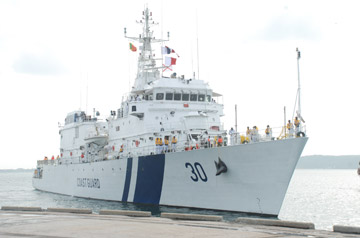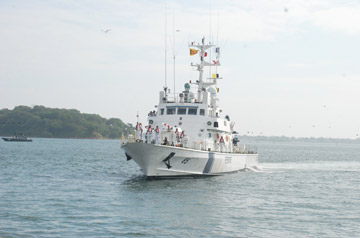|
Tri-Lateral Tabletop Exercise 2013:
Maritime endeavour to overcome disasters
By Ranil Wijayapala
The preparedness of any nation in an emergency situations such as
natural disasters or man -made disasters will always keep that nation
resilient to disaster. As an island nation it is important for Sri Lanka
to keep close contacts with regional nations and to have continuous
dialogue to face such situations. This cooperation becomes more
important when regional nations are bounded by the sea common to all.
 As nations in the Indian Ocean Sri Lanka, India and the Maldives
continued that relationship uninterrupted despite the ups and downs in
the bilateral relations specially Sri Lanka and India enjoyed in the
recent past. Sri Lanka witness yet another instance of that
uninterrupted cooperation among India, Sri Lanka and Maldives when the
Coast Guards of the three nations participated in a ‘Tri-Lateral
Tabletop Exercise 2013” in Sri Lanka this week. As nations in the Indian Ocean Sri Lanka, India and the Maldives
continued that relationship uninterrupted despite the ups and downs in
the bilateral relations specially Sri Lanka and India enjoyed in the
recent past. Sri Lanka witness yet another instance of that
uninterrupted cooperation among India, Sri Lanka and Maldives when the
Coast Guards of the three nations participated in a ‘Tri-Lateral
Tabletop Exercise 2013” in Sri Lanka this week.
The Trilateral Tabletop Exercise (TTEX) 2013 was, an outcome of the
Second National Security Advisor Level meeting on tri lateral
cooperation for security between India, the Maldives and Sri Lanka which
took place in Colombo on July 8, 2013.
In the Road Map of future co-operation, strengthening the tri Lateral
exercise “Dosthi” every alternate year in Maldives, conducting table top
exercise and seminars on maritime issues in every other alternate year,
was charted and Sri Lanka Coast Guard took the responsibility of
conducting the first Tabletop exercise this year.
Accordingly Sri Lanka Coast Guard hosted the first Tabletop Exercise
in Trincomalee from December 18 to 20 under the theme ‘Trilateral
Response to Search and Rescue, Oil Spill and Maritime Piracy’ with the
participation of Naval and Coast Guard officers from India, Maldives and
Sri Lanka at the Admiral Wasantha Karannagoda auditorium in Trincomalee.
Officers from the Indian Coast Guard, Maldives Coast Guard and Sri
Lanka Coast Guard presented three papers on “Response to Oil spills:
Importance of Awareness, Preparedness and Regional Approach”, “Maritime
Piracy: Challenges in the Region and Countermeasures” and “Mass SAR:
Regional Challenges and Way ahead” respectively. Officers from the Sri
Lanka Army and Sri Lanka Air Force also participated in the exercise as
observers.
A highlight of this Trilateral Desktop exercise was the visit of two
Indian Coast Guard Ships ‘Vishwast and Rajkamal’to Trincomalee harbour
on a good will visit parallel to the Trilateral Tabletop Exercise at a
time Tamil Nadu politicians are demanding that India should not give
chances for the Sri Lanka military personnel to undergo training in
India.
The two Coast Guard ships were there in Trincomalee from 18 to 20 and
expected to call on Port of Colombo on December 22 until they leave on
December 26.
During their stay, the Indian Coast Guard ships conducted number of
training sessions for Sri Lanka Navy and Coast Guard personnel on search
and rescue and oil spill response. The two ships also expected
conducting a passage exercise each in Trincomalee and Colombo.
The Trilateral Tabletop Exercise participants also got an opportunity
to be on board the two ships for a practical demonstration of pollution
response during their exercise.
Director General of Sri Lanka Coast Guard Rear Admiral Ravindra C
Wijegunaratne delivering the key note address highlighted the importance
of trilateral response to major issues such as maritime search and
rescue (SAR), oil spill and maritime piracy. He further expressed the
importance of regional approach, coordination and cooperation in
effectively arresting the above challenges.
“This Tri Lateral Table top exercise will be conducted through
discussions, exchange of ideas expertise among participants. In the
process, we will learn from each other so that we know our strengths and
weaknesses.
There will be opportunity for each country to share the expertise and
experience to make the cooperation among the three nations to
effectively respond during an emergency or in a natural disaster”, he
said.
“Ranking as the third largest water body in the world and containing
some of the most important sea lanes which continue feeding some of the
biggest economic giants in the region, safety and security of the Indian
Ocean remains a critical factor for the economic sustainability of the
countries which border the Indian Ocean and those who frequent the sea
lanes carrying vital cargo.
In this context, the safety and security of the Indian Ocean becomes
a global responsibility.
 “On the line of maritime search and rescue, whether a country is
party to a certain Conventions or not, we all have an obligation in
responding to SAR”, he added. “On the line of maritime search and rescue, whether a country is
party to a certain Conventions or not, we all have an obligation in
responding to SAR”, he added.
“So, no matter where an accident occurs, rescue of persons in
distress at sea will be co-ordinated by a SAR organization and, when
necessary, by co-operation between neighbouring SAR organizations.
Parties to the Convention are required to ensure that arrangements are
made for the provision of adequate SAR services in their coastal waters.
Parties are encouraged to enter into SAR agreements with neighbouring
States involving the establishment of SAR regions, pooling of
facilities, establishment of common procedures and training.
Preparedness, higher level of training and coordination will help save
lives during a disaster”, Rear Admiral Wijegunaratne said.
He said chart showing the SAR regions in the Indian Ocean show the
vastness of the areas we are responsible and one country will not have
sufficient assets to respond in quick and effective manner.
“Responding to Oil spills is another area where we need to be
prepared. With the ever increasing maritime oil transportation around
the world and especially through the Indian Ocean, an oil spill in our
ocean area can create a huge challenge in terms of oil spill
containment. Sri Lanka is yet to fully geared up to face a sizable oil
spill in terms of professional knowledge and much required equipment”,
he added.
“The other important area is maritime piracy. Even though our region
is not badly affected by maritime piracy, high degree of preparedness
among our navies and Coast Guards will have a great impact in responding
to any eventualities. However, worldwide incidents of maritime piracy
are on the decline, but ship operators shouldn’t assume that the problem
has been put to rest”, he added.
“With the intention of educating onboard security teams on merchant
ships on Best Management Practices against Somali-based pirates,
commonly known as BMP4, Sri Lanka Coast Guard started training on board
security teams on BMP4”, he added.
He requested all participants to make every endeavour to find
solutions to some of the issues that three nations individually as well
as regionally facing in responding to above three main areas.
|

